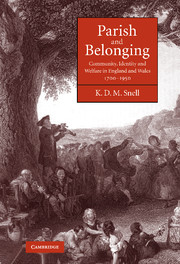Book contents
- Frontmatter
- Contents
- List of figures
- List of tables
- Preface and acknowledgements
- 1 Introduction – belonging and local attachment
- 2 The culture of local xenophobia
- 3 Settlement, parochial belonging and entitlement
- 4 Rural societies and their marriage patterns
- 5 ‘A cruel kindness’: parish out-door relief and the new poor law
- 6 Nailed to the church door? Parish overseers and the new poor law
- 7 Three centuries of new parishes
- 8 ‘Of this parish’: gravestones, belonging and local attachment
- 9 Conclusion – belonging, parish and community
- Select bibliography
- Subject and persons index
- Places index
6 - Nailed to the church door? Parish overseers and the new poor law
Published online by Cambridge University Press: 27 July 2009
- Frontmatter
- Contents
- List of figures
- List of tables
- Preface and acknowledgements
- 1 Introduction – belonging and local attachment
- 2 The culture of local xenophobia
- 3 Settlement, parochial belonging and entitlement
- 4 Rural societies and their marriage patterns
- 5 ‘A cruel kindness’: parish out-door relief and the new poor law
- 6 Nailed to the church door? Parish overseers and the new poor law
- 7 Three centuries of new parishes
- 8 ‘Of this parish’: gravestones, belonging and local attachment
- 9 Conclusion – belonging, parish and community
- Select bibliography
- Subject and persons index
- Places index
Summary
The office of Overseer, which, at the time of its origin, simply involved the collection and expenditure of funds for the relief of the poor, is now rapidly becoming, from the effect of modern legislation, an office of considerable importance and responsibility.
There are certain powers and duties … which still belong to the overseers of the several parishes, independently of the guardians. Such, for example, are the assessment of the poor-rates, and the removal of paupers to the parishes of their settlement. In incurring any legal expenses in matters of this kind, the overseers are under no obligation to consult the guardians, and the guardians have no power to control the overseers.
The Webbs referred to the new poor law of 1834 as ‘the strangulation of the parish’, a view endorsed as dramatic but not unjust by W. E. Tate in his The Parish Chest. Tate took the view that ‘Eventually … the old parochial system was wound up by the Act of 1834.’ So he ended his well-known book at that date. The parish chest, it would seem, remained permanently padlocked and redundant from then on, eventually to be opened by local historians. It might have appeared, to a long-buried Thomas Gray, that 1834 was a curfew which tolled the knell of parting days for the parish.
- Type
- Chapter
- Information
- Parish and BelongingCommunity, Identity and Welfare in England and Wales, 1700–1950, pp. 339 - 365Publisher: Cambridge University PressPrint publication year: 2006



